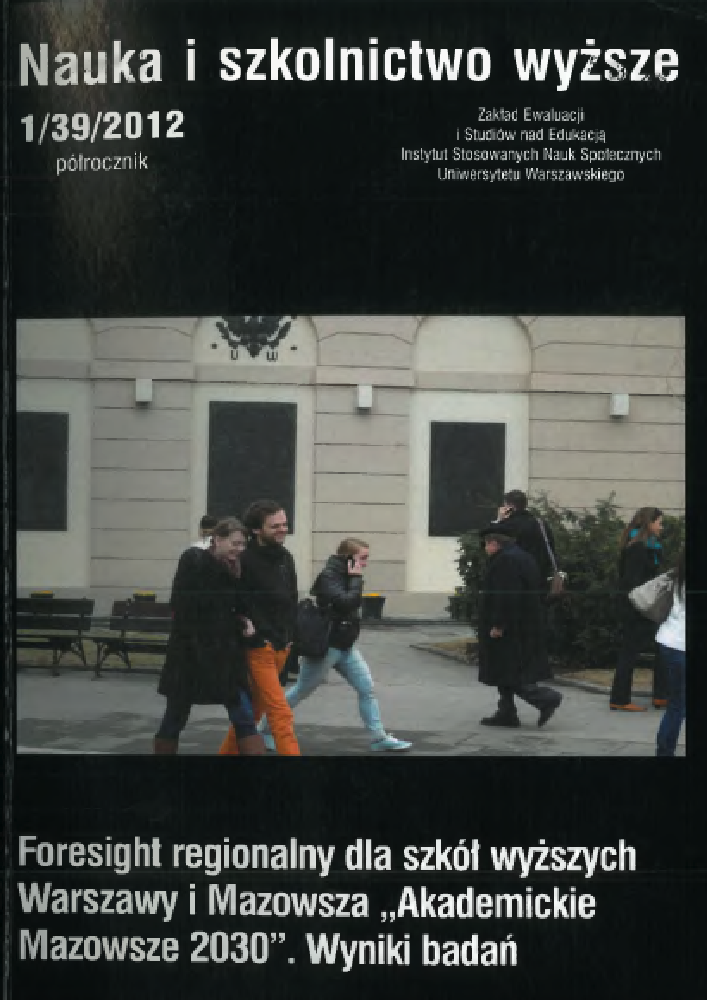Abstract
The author is presenting findings of colleges conducted amongst academic career development agencies of the Masovian province as part of the project ‘‘Regional foresight for higher education institutions of Warsaw and Masovia «Academic Masovia 2030»” about the demand of employers for determined qualifications and competence of graduates of the college. She is presenting forms of assistance in planning the professional career of students and graduates, offered by career development agencies; problems, with which 1 st and 2nd degree college graduates are reporting to them and factors facilitating the work market penetration for graduates. She is also analyzing fields of cooperation of academic career development agencies with employers, the structure of the demand reported by employers for graduates of higher education institutions and the structure of interest of students and graduates in specific types of job offers. The gathered materiał shows that all graduates (of both second and first degree studies) most often need the help of career development agencies for job finding, internship or trainee-ship, while employers are rather prepared for a less active and involving cooperation, limited to placing job offers on websites and in the database of career development agencies, and to the transmission of information about the company and its needs. The placement is simpler for graduates of public colleges who finished full-time studies, especially in the Computer or technical profile. Graduated-women have much greater problems in finding their first work than men. Over one third of academic career development agencies is confirming that it is hard for their graduates to find employment and often many-months job-hunt does not bring desired effects. The majority of offers submitted by employers is regarding temporary work -these are proposals of smali and micro companies. Meanwhile potential employees are most interested in a steady job, particularly when it is offered by a big or average company. It is noticed that for employees of career development agencies acting in: technical higher education institutions, Warsaw colleges as well as private higher education institutions do decidedly more rarely see threats connected with acquiring the work by their graduates.
References
Działalność... 2011 Działalność akademickich biur karier na Mazowszu. Raport z badania firmy MillwardBrown SMG/KRC, Warszawa, grudzień, opracowanie źródłowe przygotowane na rzecz projektu „Foresight regionalny dla szkół wyższych Warszawy i Mazowsza «Akademickie Mazowsze 2030»”, Warszawa.
Kwalifikacjo... 2012 Kwalifikacje i kompetencje absolwentów - opinie uczelnianych biur karier województwa mazowieckiego, w: Diagnoza zapotrzebowania na kwalifikacje i kompetencje absolwentów szkól wyższych Mazowsza wchodzących na rynek pracy. Raport z badania przygotowanego w ramach projektu „Foresight regionalny dla szkół wyższych Warszawy i Mazowsza «Akademickie Mazowsze 2030»”, Warszawa.
Targi pracy... 2009 Targi pracy w oczach warszawskich studentów i absolwentów. Raport z badania, MJCC Employer Branding Consultants, Warszawa (http://www.mjcc.pl/secms/pl/badanie_Targi-PracyJobbing).
Uczelnia... 2010 Uczelnia Przyjazna Pracodawcom, Instytut Pracy i Spraw Socjalnych, Warszawa (http://www.uczelniaprzyjaznapracodawcom.pl/raport-uczelnia-przyjazna-pracodawcom).
Ustawa... 2004 Ustawa o promocji zatrudnienia i instytucjach rynku pracy z 20 kwietnia 2004 roku, tekst jednolity „Dziennik Ustaw” z 2008 r. Nr 69, poz. 415, z późn. zm.
